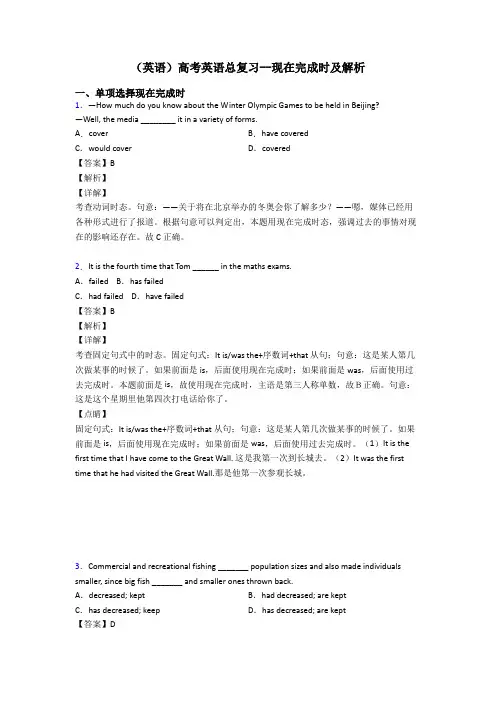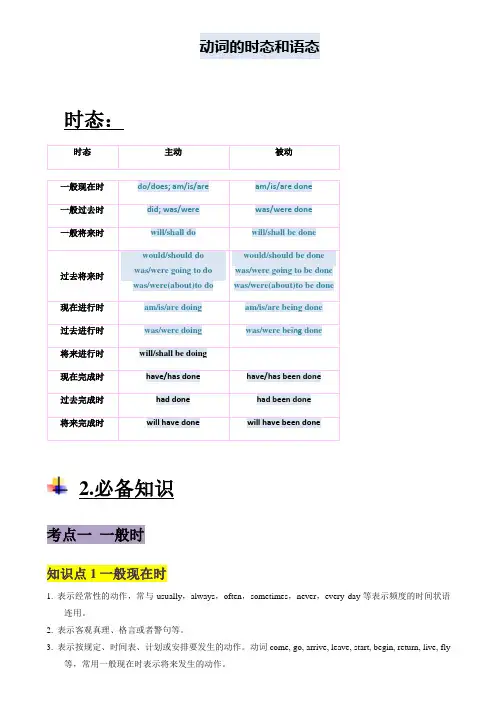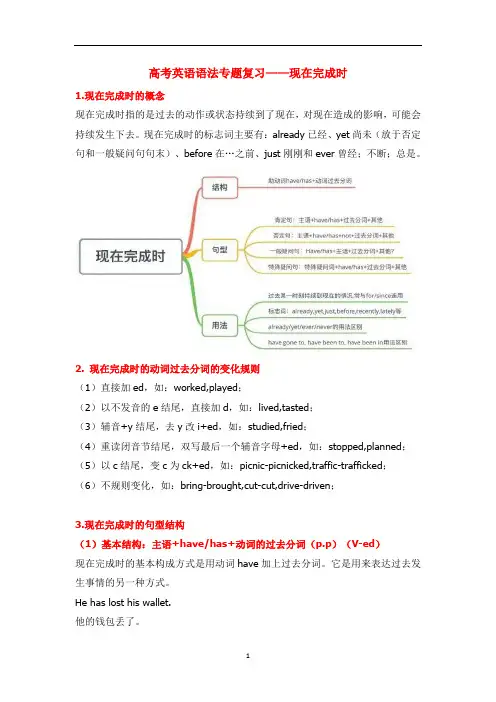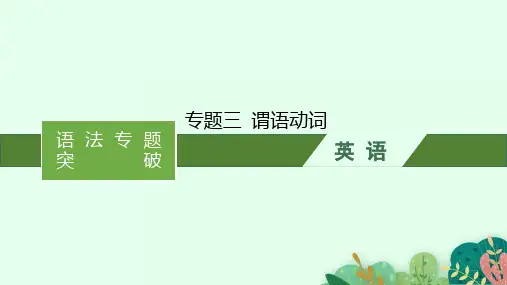高考一轮复习之现在完成时
- 格式:ppt
- 大小:1.90 MB
- 文档页数:41

(7)现在完成时及被动语态—2023届高考英语一轮复习语法总动员之动词时态语态一、填空题1.This is the first time that I _____________(visit) the Great Wall.2.The number of overseas students studying at UK universities ______(rise) to 330,000—one in seven of the total by now.3.The number of road accidents ______(increase) over the past year.4.It is the third time that he ______(visit) our beautiful city Harbin.5.China ______(welcome) Western fashion and futuristic technology during the last decades.6.It's too late! The radio says the city _____(flood) already.7.By the end of last year, another new gymnasium ________________(complete) in Beijing.8.Animal products like pearls and silk _____(serve) as decoration for many years.9.In the last few years thousands of films _________(produce) all over the world.10.It's the first time that the computer _____(check) since I bought it.二、阅读下面短文,在空白处填入1个适当的单词或括号内单词的正确形式。

(英语)高考英语总复习--现在完成时含解析一、单项选择现在完成时1.Never _______ a greater, or more beautiful, or a calmer or nobler thing than you.A.did I see B.have I seenC.I saw D.I have seen【答案】B【解析】【详解】考查时态和倒装。
句意:我从未见过比你更伟大、更美丽、更冷静、更高贵的东西。
Never 位于句首时,要进行部分倒装,强调过去的动作对现在的影响要用现在完成时,故B项正确。
【点睛】倒装是高中英语的常见考点,注意当含有否定意义的词,如never,hardly,seldom,little,few,not until及not only等位于句首时,其后需要用部分倒装。
2.It is the fourth time that Tom ______ in the maths exams.A.failed B.has failedC.had failed D.have failed【答案】B【解析】【详解】考查固定句式中的时态。
固定句式:It is/was the+序数词+that 从句;句意:这是某人第几次做某事的时候了。
如果前面是is,后面使用现在完成时;如果前面是was,后面使用过去完成时。
本题前面是is,故使用现在完成时,主语是第三人称单数,故B正确。
句意:这是这个星期里他第四次打电话给你了。
【点睛】固定句式:It is/was the+序数词+that 从句;句意:这是某人第几次做某事的时候了。
如果前面是is,后面使用现在完成时;如果前面是was,后面使用过去完成时。
(1)It is the first time that I have come to the Great Wall. 这是我第一次到长城去。
(2)It was the first time that he had visited the Great Wall.那是他第一次参观长城。

(英语)高考英语总复习--现在完成时及解析一、单项选择现在完成时1.—How much do you know about the Winter Olympic Games to be held in Beijing?—Well, the media ________ it in a variety of forms.A.cover B.have coveredC.would cover D.covered【答案】B【解析】【详解】考查动词时态。
句意:——关于将在北京举办的冬奥会你了解多少?——嗯,媒体已经用各种形式进行了报道。
根据句意可以判定出,本题用现在完成时态,强调过去的事情对现在的影响还存在。
故C正确。
2.It is the fourth time that Tom ______ in the maths exams.A.failed B.has failedC.had failed D.have failed【答案】B【解析】【详解】考查固定句式中的时态。
固定句式:It is/was the+序数词+that 从句;句意:这是某人第几次做某事的时候了。
如果前面是is,后面使用现在完成时;如果前面是was,后面使用过去完成时。
本题前面是is,故使用现在完成时,主语是第三人称单数,故B正确。
句意:这是这个星期里他第四次打电话给你了。
【点睛】固定句式:It is/was the+序数词+that 从句;句意:这是某人第几次做某事的时候了。
如果前面是is,后面使用现在完成时;如果前面是was,后面使用过去完成时。
(1)It is the first time that I have come to the Great Wall. 这是我第一次到长城去。
(2)It was the first time that he had visited the Great Wall.那是他第一次参观长城。
3.Commercial and recreational fishing _______ population sizes and also made individuals smaller, since big fish _______ and smaller ones thrown back.A.decreased; kept B.had decreased; are keptC.has decreased; keep D.has decreased; are kept【答案】D【解析】【详解】考查时态和语态。

动词的时态和语态时态:时态主动被动一般现在时do/does; am/is/are am/is/are done一般过去时did; was/were was/were done 一般将来时will/shall do will/shall be done过去将来时would/should dowas/were going to dowas/were(about)to dowould/should be donewas/were going to be donewas/were(about)to be done现在进行时am/is/are doing am/is/are being done过去进行时was/were doing was/were be ing done将来进行时will/shall be doing现在完成时have/has done have/has been done过去完成时had done had been done将来完成时will have done will have been done2.必备知识考点一一般时知识点1一般现在时1.表示经常性的动作,常与usually,always,often,sometimes,never,every day等表示频度的时间状语连用。
2.表示客观真理、格言或者警句等。
3.表示按规定、时间表、计划或安排要发生的动作。
动词come, go, arrive, leave, start, begin, return, live, fly等,常用一般现在时表示将来发生的动作。
4.在时间、条件等状语从句中常用一般现在时代替一般将来时。
5.以here/there开头引导的倒装句,表示正在发生的动作/状态6.用于文章标题、图片说明、电影说明、戏剧内容及场景解说等。
知识点2一般过去时1. 表示在过去发生的一次性动作或习惯性动作或存在的状态,常用yesterday,last year,in 1995,the other day等作时间状语。



(英语)高考英语一轮复习专项训练现在完成时及解析一、单项选择现在完成时1.More and more cancer patients _________ in hospital owing to polluted environment and people’s bad lifestyles.A.treated B.have treatedC.have been treated D.had been treated【答案】C【解析】【详解】考查时态语态。
句意:由于被污染了的环境和人们糟糕的生活方式,越来越多的癌症病人正在医院里接受治疗。
本句主语more and more cancer patients与动词treat构成被动关系,要使用被动语态;而且很多病人接受治疗是已经发生的事情,要用完成时表示,所以本句使用现在完成时的被动语态,故选择C项。
2.The disease is a huge blow for the farmers. Hundreds of them ______ their animals, livelihood and hopes destroyed and many others fear they _____ the same fate.A.have seen; will suffer B.saw; sufferedC.had seen; was to suffer D.see; suffer【答案】A【解析】【详解】考查时态。
句意:这种疾病对农民来说是一个巨大的打击。
数以百计的人目睹了他们的动物、生计和希望被摧毁,还有许多人担心他们会遭受同样的命运。
结合句意可知第一空用现在完成时态;第二空用一般将来时态。
故选A。
3.In the past twenty years, a huge amount of environmental damage ________ by air pollution. A.has been caused B.have been causedC.was caused D.were caused【答案】A【解析】【详解】考查时态和主谓一致。

高考英语语法专题复习——现在完成时1.现在完成时的概念现在完成时指的是过去的动作或状态持续到了现在,对现在造成的影响,可能会持续发生下去。
现在完成时的标志词主要有:already已经、yet尚未(放于否定句和一般疑问句句末)、before在…之前、just刚刚和ever曾经;不断;总是。
2. 现在完成时的动词过去分词的变化规则(1)直接加ed,如:worked,played;(2)以不发音的e结尾,直接加d,如:lived,tasted;(3)辅音+y结尾,去y改i+ed,如:studied,fried;(4)重读闭音节结尾,双写最后一个辅音字母+ed,如:stopped,planned;(5)以c结尾,变c为ck+ed,如:picnic-picnicked,traffic-trafficked;(6)不规则变化,如:bring-brought,cut-cut,drive-driven;3.现在完成时的句型结构(1)基本结构:主语+have/has+动词的过去分词(p.p)(V-ed)现在完成时的基本构成方式是用动词have加上过去分词。
它是用来表达过去发生事情的另一种方式。
He has lost his wallet.他的钱包丢了。
She has had lunch,so she is not hungry now.她已经吃过午餐了。
We have seen that film before.之前我们已经看过那部电影了。
I have just finished my homework.我刚刚完成我的家庭作业。
(2)肯定句:主语+have/has+动词的过去分词(p.p)(V-ed)+宾语(have/has done)例句:I have told her the truth.我已经告诉了她真相。
I have found my schoolbag.我已经找到了我的书包。
We've had too much rain this year.今年雨水太多。


2021年高考英语一轮复习每日一题(第10周)现在完成时(含解析)高考频度:★★★★★难易程度:★★★★☆1.(2021·北京卷·单项填空)I ____________ half of the English novel, and I’ll try to finish it at the weekend.A. readB. have readC. am readingD. will read【答案】 B2. In the last few years, China __________ great achievements in environmental protection.A. has madeB. had madeC. was makingD.is making【答案】A【解析】句意:在过去的这些年里,中国在环境爱护中取得了专门大的成就。
由时刻状语in the last few years可推知动作从过去一段时刻连续到现在并对现在造成阻碍,用现在完成时。
故选A。
【应试必备】现在完成时及其用法1. 现在完成时结构:主语 + 助动词have(has) + 动词过去分词否定句:have/has后加not, haven’t/hasn’t一样疑问句:have/has提早2. 现在完成时的用法:(1)表示过去发生的某一动作对现在造成的阻碍或产生的结果,强调的是那个结果或阻碍,常与yet,already,just,before,lately等时刻状语连用。
—Have you had your lunch yet? 你吃过午饭了吗?—Yes, I have. I have just had it. 是的,我刚吃过。
(现在我不饿了。
)I have already posted the photos. 我差不多寄过这些照片了。
(这些照片已不在我那个地点了。
)(2)过去发生的情况,一直连续到现在(其谓语动词多是连续性动词或表示状态的词)。

高考英语语法知识点梳理现在完成时用法讲义一、现在完成时概念:①过去发生的动作对现在造成的影响或结果:强调结果Yesterday Ifinished my homework, that’s to say, I have finished my homeworknow.②过去已经开始一直持续到现在的动作或状态:强调继续He haslived here since 1978.二、现在完成时的构成:现在完成时由“have(has)+过去分词”构成。
has 用于主语是第三人称单数时。
①I have just finished my homework. 我刚做完功课②I have lived in Guangzhou for more than three years. 我已经在广州住了三年多了。
③My sister has seen the movie many times. 那部电影我姐姐看过好多次了。
现在完成时的否定句和疑问句的构成。
否定句:主语+have /has +not+过去分词+其他.说明:have和has常与not 缩写成haven't 和hasn't .①I haven't seen much of him recently 最近我没怎么见到他。
②He hasn't been to Japan.他没有去过日本。
一般疑问句:Have /Has +主语+过去分词+其它?肯定回答:Yes, 主语+have /has.否定回答:No, 主语+have /has not。
③——Have you finished your homework ? 你已经做完家庭作业了吗?——Yes, I have. (No, I haven't ) 是的。
(不,还没有)④–-Has he passed the test yet ? 他考试及格了吗—-Yes, he has. (No , he hasn't ) 是的。
现在完成时试题 2019年高考英语一轮复习 Word版含解析2018年9月7日,考点为现在完成时。
在以下题目中,我们需要填写正确的动词时态。
1.(2018·北京卷·单项填空)中国的高速铁路在过去几年里已经从9,000公里增长到25,000公里。
正确选项为B,即“have grown”。
这句话需要用现在完成时态,因为它描述的是一个从过去一直延续到现在的情况。
2.(2016·北京卷·单项填空)我已经读了一半的英语小说,周末我会尝试把它读完。
正确选项为B,即“have read”。
这句话需要用现在完成时态,因为它描述的是已经完成的动作对现在的影响。
3.(2018·新课标卷I·语法填空)自2011年以来,中国种植的玉米比水稻多。
正确答案为“has grown”。
这句话需要用现在完成时态,因为它描述的是从过去一直延续到现在的情况。
现在完成时是由助动词“have/has”和动词的过去分词构成的,用于描述过去发生的动作对现在的影响或产生的结果。
它通常与时间状语“yet,already,just,before,lately”等连用。
I have already sent the photos。
The photos are no longer with me.There is a difference een "have (has) gone to," "have (has) been to," and "have (has) been in/at."1."Have (has) gone to" means "have already gone to a place" and cannot be used with "for" and a n of time。
高考英语专题之现在完成时一. 教学内容:现在完成时1. 表示将来的几种形式2. 现在完成时3. 现在进行时及特殊用法二. 重、难点讲解表示将来的几种形式1. 一般将来时:shall / will + 动词原型1)表示未发生或将来存在的状态。
When will they leave for Shanghai?2)表示同意或答应做某事。
That bag looks heavy. I will help you with it.I won’t tell anyone what happened, I promise.2. be going to + 动词原型表示“打算,准备”做某事,多用于口语中侧重于说话者根据客观的种种迹象,判断将要发生的事件或事先做出的安排,因而有一定的预见性和心理准备。
will / shall表示临时性的决定。
1)Look at those clouds. It’s going to rain2)—Your teacher, Mr Zhang, is ill in hospital.—I know. I’m going to see him this afternoon.3)—Your teacher, Mr Zhang, is ill in hospital.—Really? I’ll go to see him this afternoon.3. be + 动词不定式◆表示按计划或安排即将发生的动作,在陈述句中可以和be going to互换,差别不大。
1)We’re to meet at the school gate.我们约定在校门口见面。
2)The Queen is to visit Japan next year.3)The railway is to be opened to traffic on National Day.4)She is to get married next month.◆表示“指令”、“命令”,相当于have to或must;用于疑问句时,表示征求意见。